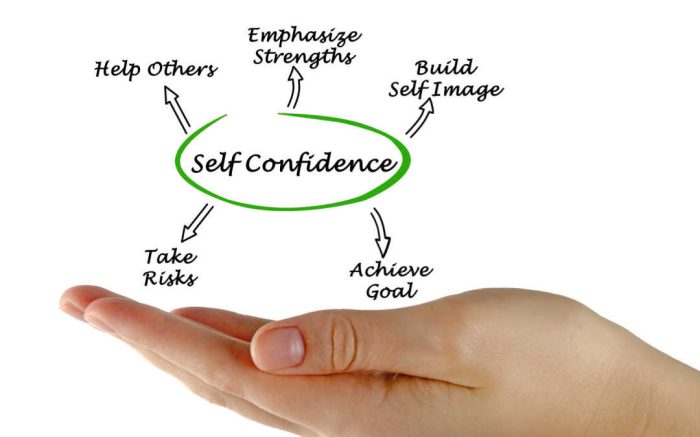Building Self-Confidence starts with understanding what it truly means and how it impacts every aspect of your life. Dive into the journey of self-discovery and empowerment as we explore the key elements that contribute to boosting your self-esteem.
From setting achievable goals to stepping out of comfort zones, this guide will provide you with practical strategies to cultivate a positive mindset and overcome self-doubt. Get ready to embark on a transformational journey towards building the self-confidence you deserve.
Understanding Self-Confidence
Self-confidence is the belief in one’s abilities, qualities, and judgment. It is the assurance of one’s own worth and the ability to trust oneself in various situations.
Self-confidence plays a crucial role in personal development as it empowers individuals to take risks, face challenges, and pursue their goals with determination. It helps in overcoming self-doubt, fear of failure, and allows individuals to embrace their uniqueness.
Impact of Self-Confidence
- Academic Success: Students with self-confidence are more likely to participate in class, seek help when needed, and perform better academically.
- Professional Growth: Confidence at work can lead to better job performance, effective communication, and opportunities for career advancement.
- Relationships: Self-confident individuals tend to have healthier relationships, set boundaries, and communicate their needs effectively.
- Mental Health: High self-confidence is linked to lower levels of stress, anxiety, and depression, promoting overall well-being.
Building Blocks of Self-Confidence
Building self-confidence is essential for personal growth and success. It is influenced by various factors that contribute to shaping an individual’s self-esteem and belief in their abilities.
Key Factors for Building Self-Confidence
- Positive Self-Talk: Engaging in positive affirmations and challenging negative thoughts can help reframe perspectives and build self-confidence.
- Setting Achievable Goals: Establishing realistic and attainable goals provides a sense of accomplishment and boosts self-confidence when they are achieved.
- Seeking Feedback: Receiving constructive feedback from others can offer valuable insights for self-improvement and reinforcement of strengths.
- Embracing Failure: Viewing failures as learning opportunities rather than setbacks can foster resilience and enhance self-confidence.
Role of Self-Awareness in Enhancing Self-Confidence
Self-awareness plays a crucial role in enhancing self-confidence as it involves recognizing one’s strengths, weaknesses, values, and emotions. By understanding oneself better, individuals can leverage their strengths, work on areas of improvement, and build a more authentic sense of self-confidence.
Strategies for Setting Achievable Goals to Boost Self-Confidence
- SMART Goals: Setting Specific, Measurable, Achievable, Relevant, and Time-bound goals helps provide clarity and direction for personal growth.
- Break Goals into Smaller Steps: Breaking down larger goals into smaller, manageable tasks can make them less overwhelming and increase the likelihood of success.
- Celebrate Progress: Acknowledging and celebrating even small milestones towards a goal can reinforce positive behavior and build self-confidence along the way.
- Seek Support: Surrounding oneself with a supportive network of friends, family, or mentors can offer encouragement, motivation, and accountability in achieving goals.
Overcoming Self-Doubt: Building Self-Confidence

Self-doubt can be a major obstacle on the path to building self-confidence. It can stem from various sources such as past failures, negative self-talk, comparison to others, or fear of the unknown. Overcoming self-doubt is crucial to unlock your true potential and lead a fulfilling life.
Recognizing Triggers of Self-Doubt
- Acknowledge negative thought patterns: Identifying and challenging negative thoughts can help break the cycle of self-doubt.
- Avoid comparing yourself to others: Focus on your own progress and achievements instead of constantly measuring yourself against others.
- Address past failures: Learn from past mistakes and use them as stepping stones for growth rather than reasons for self-doubt.
Techniques for Overcoming Self-Doubt
- Practice self-compassion: Treat yourself with kindness and understanding, just as you would a friend in need.
- Set realistic goals: Break down larger goals into smaller, achievable steps to build confidence along the way.
- Seek support: Surround yourself with positive and encouraging individuals who can uplift you during moments of self-doubt.
Personal Success Story
“I used to doubt my abilities in public speaking, but through consistent practice and positive reinforcement from friends, I overcame my fear and now confidently speak in front of large audiences.”
Cultivating a Positive Mindset

Having a positive mindset is crucial for boosting self-confidence and overall well-being. When you maintain a positive outlook on life, you are more likely to believe in yourself, take on challenges, and persevere through difficulties.
Tips for Developing a Positive Outlook on Life
- Acknowledge and challenge negative thoughts: Identify negative thought patterns and replace them with positive affirmations. Challenge the validity of your negative beliefs.
- Practice gratitude: Take time each day to reflect on things you are grateful for. This can help shift your focus from what’s lacking to what you already have.
- Surround yourself with positivity: Surround yourself with supportive and optimistic people who uplift you. Limit exposure to negative influences.
- Engage in self-care: Take care of your physical and emotional well-being through activities like exercise, meditation, hobbies, and relaxation.
Impact of Self-Talk and Affirmations on Building Self-Confidence
Self-talk plays a significant role in shaping our self-perception and confidence levels. By practicing positive self-talk and affirmations, you can rewire your brain to focus on your strengths and capabilities. Affirmations are powerful statements that can help boost self-esteem and reinforce positive beliefs about yourself. By regularly affirming your worth and abilities, you can cultivate a more confident mindset and overcome self-doubt.
Stepping Out of Comfort Zones
Stepping out of comfort zones is crucial for building self-confidence as it allows individuals to push past their fears and limitations, ultimately leading to personal growth and development. By taking risks and facing new challenges, individuals can prove to themselves that they are capable of overcoming obstacles, which in turn boosts their confidence levels.
Importance of Stepping Out of Comfort Zones, Building Self-Confidence
Stepping out of comfort zones helps individuals break free from stagnation and complacency, opening up doors to new opportunities and experiences. It enables them to discover their true potential and strengths by testing their limits and pushing boundaries.
- By facing fears and uncertainties, individuals can build resilience and adaptability, which are essential qualities for self-confidence.
- Stepping out of comfort zones fosters a sense of accomplishment and fulfillment, reinforcing the belief that one is capable of achieving success.
- It challenges individuals to embrace change and uncertainty, leading to personal growth and a deeper understanding of oneself.
Examples of Taking Risks for Increased Self-Confidence
When individuals take risks and step out of their comfort zones, they often experience significant personal growth and increased self-confidence. Here are some examples:
- Public speaking: By volunteering to speak in front of a large audience, individuals can overcome their fear of public speaking and gain confidence in their communication skills.
- Starting a new hobby or activity: Trying something completely new and unfamiliar can boost self-esteem and provide a sense of achievement when mastering a new skill.
- Traveling solo: Exploring new destinations alone can build self-reliance and independence, leading to greater self-assurance.
Practical Advice on Expanding Comfort Zones
Expanding comfort zones can be a gradual process that involves taking small steps outside of familiar territory. Here are some practical tips to help individuals expand their comfort zones:
- Set achievable goals: Start with manageable challenges that slightly push boundaries, gradually increasing the level of difficulty over time.
- Seek support: Surround yourself with a supportive network of friends, family, or mentors who can encourage and motivate you to take risks.
- Embrace failure: Understand that setbacks and failures are part of the learning process, and use them as opportunities to grow and improve.
Seeking Support and Feedback
Seeking support and feedback plays a crucial role in building self-confidence. Having a supportive network can provide encouragement, guidance, and reassurance on your journey to boost self-esteem.
Tips for Seeking Constructive Feedback
- Be open to feedback: Approach feedback with an open mind and willingness to learn and grow.
- Ask specific questions: Instead of vague inquiries, ask for specific feedback on areas you want to improve.
- Seek feedback from diverse sources: Get feedback from a variety of people to gain different perspectives and insights.
- Focus on constructive criticism: Look for feedback that offers actionable steps for improvement rather than just criticism.
- Express gratitude: Show appreciation for the feedback received, whether positive or constructive, to encourage more input in the future.
Benefits of Mentorship or Coaching
- Personalized guidance: Mentors or coaches can provide personalized support tailored to your specific needs and goals.
- Accountability: Having a mentor or coach can help keep you accountable and motivated to work towards your self-confidence goals.
- Learning from experience: Mentors can share their own experiences and insights, helping you avoid common pitfalls and accelerate your growth.
- Building networks: Mentors can also connect you with valuable contacts and resources to further support your self-confidence journey.
- Boosting self-belief: Through encouragement and support, mentors or coaches can help you believe in your abilities and potential.